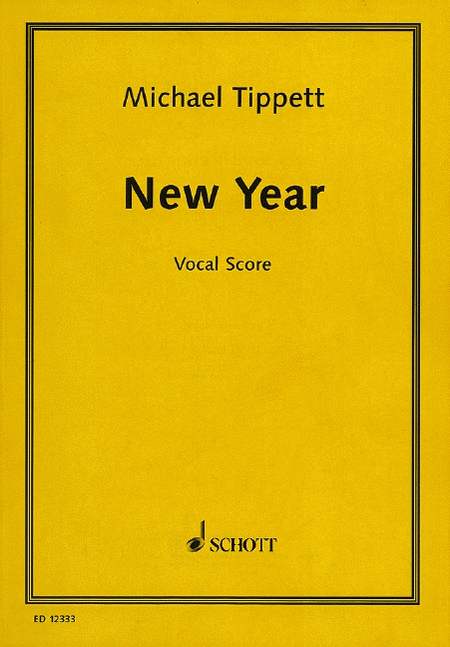Digital Download SKU: S9.Q3655 Opera in 3 acts. Composed by Sir Michael Tippett. This edition: vocal/piano score. Downloadable, Piano reduction. Duration 102' 0. Schott Music - Digital #Q3655. Published by Schott Music - Digital (S9.Q3655). English.The wildest and most open of his operas, New Year is an extraordinarily youthful conception for a composer in his mid-eighties, a work that spins his lyrical ecstasy and rhythmic vitality into a new world on the point of disintegration. Unlike its four predecessors, all of which had been written for the Royal Opera House, this one was composed for Houston Grand Opera, a relocation that encouraged Tippett to veer from opera to musical, evenrock musical, giving space to pop song, spoken dialogue, joke and, above all, dance—the communal movement of bodies that would, as in The MidsummerMarriage but now within a much looser framework, with music say what words could not. Jo Ann and Donny—young woman and youngman, white and black, both orphans—cannot join the dance, isolated as they are inside their personal fears and fantasies. And the dance itself is imperilled by social unease in this city that is ‘Somewhere and Today’.To it come visitors from ‘Nowhere and Tomorrow’: the captain (Regan), pilot (Pelegrin) and computer wizard (Merlin) of a space vessel—though thesescience-fiction characters turn out to be ritual agents (and to have human problems of their own). Donny undergoes a magical transformation; Jo Ann, through love, gains the courage to leave the room in which she has been hiding.(Paul Griffiths)3 (3pic).2.ca.1.bcl.3sax.1.cbn-4.2.3.1-perc (s.d., t.d., b.d., jazz kit, slit dr., 2 steel dr. (high/low), brake dr., 5 tom-toms, cym., sus.cym., hi-hat, hand cym. played with mallet/steel bar, 2w.bl., wh., large tri., large tam-tam, small tam-tam, c.b., xyl., vib., glock., tub.bells, claves, guiro)-hp.egtr.bgtr-str (4.4.4.4.2min) - electronic tape - sampler kybd.
